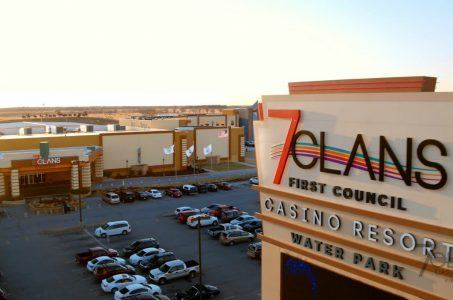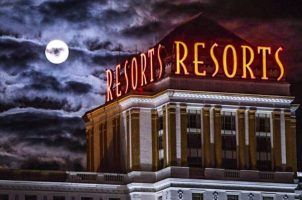Nebraska, Iowa Ask Appeals Court to Uproot Prairie Flower Casino
Posted on: April 14, 2021, 04:05h.
Last updated on: April 14, 2021, 04:23h.
The Ponca Tribe of Nebraska’s Prairie Flower Casino on the Iowa-Nebraska border should not have been built. That’s because the land on which it stands does not qualify as the tribe’s sovereign territory, it has been claimed.

This is the thrust of the argument presented by lawyers representing two states and one city to a federal appeals court heard last week.
It’s the latest chapter in the longstanding battle between the states of Nebraska and Iowa, the City of Council Bluffs, and the tribe.
The Ponca were granted federal permission to build the Prairie Flower in 2017. The casino opened in November 2018, in Carter Lake, Iowa, which, because of a geographical quirk, might as well be in Nebraska.
Iowa’s ‘City in Nebraska’
Some 140 years ago, flooding altered the course of the Missouri River, creating Carter Lake, around which a city sprang up that now shares its name. Today, it’s the only city in Iowa that lies west of the Missouri. In fact, it’s a de facto suburb of Omaha, Nebraska, and it’s completely isolated from the rest of Iowa.
The Prairie Flower Casino has irked the City of Omaha. Despite the city lending its name to the one of the world’s most famous poker variants, gaming is illegal there. The casino has also irked Council Bluffs, Iowa, which has commercial gaming operations of its own that it wants to protect from new competition.
The states and the city claim the federal government erred when it agreed to take the Carter Lake land into trust for the tribe.
They argue the lands weren’t eligible for federal designation as “restored lands” under the 1990 Ponca Restoration Act (PRA).
This is federal legislation that recognized the tribe’s sovereignty and allowed it to expand its lands to compensate for the loss of its historic reservation.
The states and the city argue that the Act limited the tribe to land in just two Nebraska counties, Boyd and Knox, which are 100 miles from Carter Lake.
In 2019, US District Judge Stephanie Rose ruled against the states and the city in favor of the feds.
Ponca Exception to the Rule?
Last week, Iowa Assistant Attorney General John Lundquist told the St. Louis-based appellate panel that the question boiled down to one issue: Did Congress intend to make an exception for the Ponca by granting it land beyond its historic homeland, as set out in the PRA? Or did it simply make a mistake?
“Does the Ponca Restoration Act establish geographic limitations on land acquisition that can be considered taken into trust…?” Lundquist asked.
The court need not look any farther than the language used in the Restoration Act to find the answer,” he continued. “Knox and Boyd counties in Nebraska are the only geographic areas specifically identified in the [PRA] as areas where the secretary can take land into trust for the benefit of the tribe.”
Representing the US Justice Department, Mary Gabrielle Sprague argued Congress did intend to make an exception for the tribe.
She said the PRA defined a large service area of 16 counties where the Ponca people live.
“[Congress] expressed clear intent to allow the Ponca people to remain living where they were living and to provide services to them,” she claimed.
Related News Articles
Most Popular
IGT Discloses Cybersecurity Incident, Financial Impact Not Clear
Sphere Threat Prompts Dolan to End Oak View Agreement
This Pizza & Wings Costs $653 at Allegiant VIP Box in Vegas!
MGM Springfield Casino Evacuated Following Weekend Blaze
Most Commented
-
VEGAS MYTHS RE-BUSTED: Casinos Pump in Extra Oxygen
— November 15, 2024 — 4 Comments -
Chukchansi Gold Casino Hit with Protests Against Disenrollment
— October 21, 2024 — 3 Comments -
VEGAS MYTHS RE-BUSTED: The Final Resting Place of Whiskey Pete
— October 25, 2024 — 3 Comments
















Last Comments ( 2 )
All a loser scene anyway?
If the controversy is over what land was originally Native lands, then both entire states just might be in jeopardy. The hate continues.